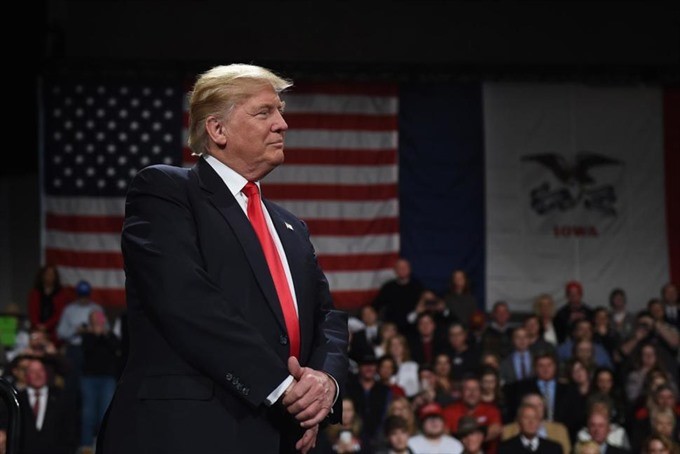America’s Electoral College on Monday confirmed Donald Trump’s election as the 45th president of the United States, unswayed by a desperate bid by die-hard opponents to bar the Republican’s path to the White House, source from Vietnamnews.

Six weeks after his upset victory over the Democrat Hillary Clinton, Trump sailed as expected past the 270 votes needed to make his victory official according to US media, clearing the way for him to succeed Barack Obama on January 20.
"We did it!" the 70-year-old billionaire tweeted after the results came in.
"Thank you to all of my great supporters, we just officially won the election (despite all of the distorted and inaccurate media)."
In a statement released by his team, the president-elect welcomed the "overwhelming vote" in his favour, while reaching out to the Democrats who sought against the odds to block him.
"With this historic step we can look forward to the bright future ahead," he said. "I will work hard to unite our country and be the president of all Americans."
Under normal circumstances, the college vote is a little-watched, rubber stamp formality in which electors - most of them party members – officially cast ballots for the candidate that won the popular tally in their state.
This time, however, the divisive nature of the campaign, Trump’s provocative personality, and Clinton’s lead of nearly three million votes in the popular tally combined to raise the stakes.
The Electoral College vote works like this: when US voters cast ballots on November 8, they did not directly elect the president but rather 538 electors charged with translating their wishes into reality.
Trump won a clear majority of those electors: 306.
Democratic activists casting the Republican as a threat to the nation staged a vocal, weeks-long campaign urging electors to break ranks and refuse to vote for him.
To bar Trump’s road to the White House, they needed to convince at least 37 Republican electors to abandon their candidate.
The odds of that happening were considered next to none.
According to a New York Times tally, four Republican electors cast their votes for someone other than Clinton, and two Republicans voted for someone other than Trump.
’Fate of our nation’
One Texas Republican elector, Christopher Suprun, had publicly said he would not vote for Trump, arguing he is unqualified to be president for reasons including conflicts of interest created by his vast overseas business holdings.
An online petition urging electors to reject Trump collected some five million supporters. Hollywood stars including Martin Sheen recently released a video to goad electors to dump Trump.
Undeterred by their outside chance of success, protesters rallied Monday at statehouses from Pennsylvania to Texas to Utah as electors gathered across the country to cast their votes.
In Wisconsin, where Trump carried a thin margin that was key to propelling him into the Oval Office, a few protesters chanted "Shame!" as the state’s 10 electoral votes for Trump were announced, the New York Times reported.
"I feel the fate of our nation is at stake here," protester Ray-Ellen Kavey, 68, told The Washington Post outside the capitol building of the Rust Belt state of Pennsylvania.
"I know nothing will come of this, but my conscience won’t let me do any less."
In New York, former president Bill Clinton cast one of the state’s 29 electoral votes for his wife.
"I’ve never cast a vote I was prouder of," he was quoted as saying by the Post.
’Cynical’
The Republican National Committee welcomed the result -- and urged Democrats to accept Trump’s victory once and for all.
"This historic election is now officially over," RNC co-chair Sharon Day said in a statement. "For the good of the country, Democrats must stop their cynical attempts to undermine the legitimacy of this election."
The anti-Trump movement gained further momentum in recent days amid the uproar over allegations of Russian hacking aimed at swaying the vote in favor of the Republican.
Ten electors -- nine Democrats and one Republican -- wrote an open letter to National Intelligence Director James Clapper seeking a briefing on the matter ahead of their vote, but their request was denied.
Even in the unlikely event that Trump had lost the Electoral College vote, it would have been up to the House of Representatives -- controlled by Republicans -- to designate the successor to President Barack Obama.
The final vote result will be formally announced in the US Congress on January 6, two weeks before the next president is to be inaugurated.
























